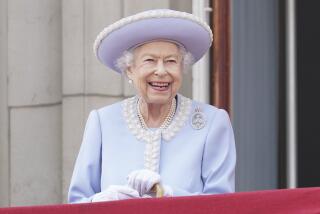‘Iron Lady’ Is Made Baroness Thatcher
- Share via
LONDON — Former Prime Minister Margaret Thatcher, the longest-serving British chief of government in this century, was named a peer of the realm today.
Thus the Right Honorable Margaret Hilda Thatcher, holder of the rare Order of Merit and member of the House of Commons from 1959 until she retired at the April national election, and often referred to as the “Iron Lady,” becomes Baroness Thatcher and will take a seat in the House of Lords.
Lady Thatcher will be joined in Lords by several other peers--all barons--newly named by Queen Elizabeth II on recommendation of Prime Minister John Major.
They include political friends of Thatcher and members of her Cabinet: Cecil Parkinson, who had to resign when his longtime affair with his secretary came to light; Nicholas Ridley, forced out of government for making anti-German remarks in a magazine interview; and Norman Tebbit, generally considered Thatcher’s Conservative Party hit-man.
They also included political foes of Thatcher: Geoffrey Howe, onetime foreign secretary who resigned over her anti-Europe stance; former Chancellor of the Exchequer Nigel Lawson, who quarreled with her on monetary policies and on Europe; and Ian Gilmore, who was appointed to her first Cabinet but did not last long.
Major also gave a peerage to former Foreign Secretary David Owen, who left the Labor Party to become one of the founders of the ill-fated Social Democratic Party. Several Labor Party stalwarts were named to peerages, including former Defense Secretary Denis Healey.
All of the newly ennobled were given life peerages, meaning they hold the rank while they live but their children do not inherit the titles.
For months there was speculation about whether Thatcher would accept a life peerage as a baroness or, as is traditional for former prime ministers, become a hereditary earl (in her case, a countess), two notches up the ladder in the pecking order from a baron in the House of Lords.
If she had accepted a hereditary title, her son, Mark, would have become an earl upon her death, something many in Britain’s political Establishment would have criticized.
As it is, since Thatcher’s husband, Denis, was made a baronet under the Major regime, their son becomes Sir Mark upon his father’s death.
More to Read
Sign up for Essential California
The most important California stories and recommendations in your inbox every morning.
You may occasionally receive promotional content from the Los Angeles Times.













